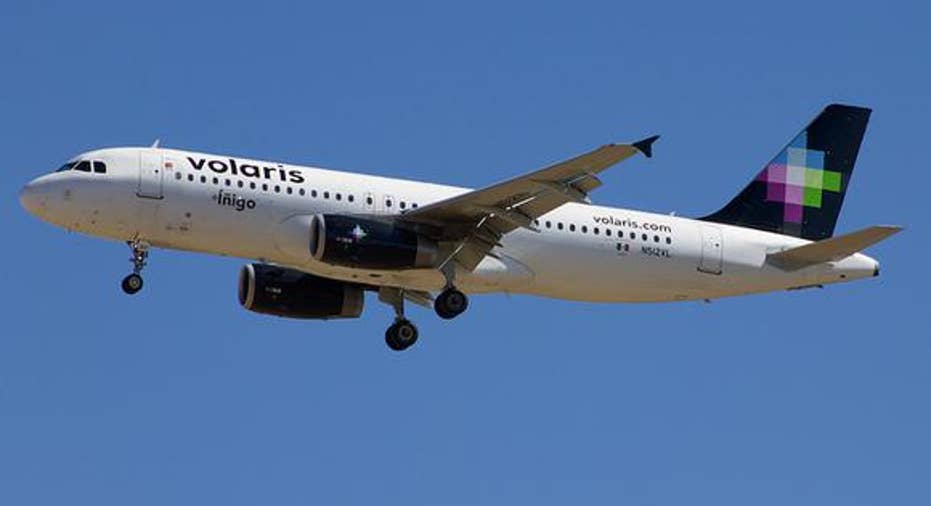Here's More Proof of Airline Investors' Irrationality

The behavior of airline stocks over the past year has been puzzling for investors. Airline profits have soared to record highs thanks to low fuel prices. However, most airline stocks have struggled, as investors have become worried about unit revenue declines.
Many airline stocks have fallen in the past year despite strong profit growth. Photo: Spirit Airlines.
This reaction neglects the significant interplay between fuel prices and fares. When fuel prices decline, it encourages airlines to grow faster by adding flights that might not be profitable with higher fuel prices. Yet if fuel prices were to rebound in the next few years, airlines could bolster their unit revenue (and profitability) by cutting these same flights.
Nothing better showcases airline investors' irrational obsession with unit revenue than a comparison of ultra-low cost carriers (ULCCs) Spirit Airlines and Volaris . Let's take a look.
Spirit plummets; Volaris risesSpirit Airlines was one of the worst-performing airline stocks of 2015. Shares of the largest U.S. ULCC have lost 40% of their value in the past year. By contrast, shares of Mexican ULCC Volaris have more than doubled in the past year, leading the industry.
Spirit Airlines vs. Volaris Stock Performance; data by YCharts.
The two airlines share very similar business models, built around minimizing unit costs, filling planes with low base fares, and making money on a variety of fees for optional add-ons.
To some extent, the vast divergence in stock performance between Spirit and Volaris last year was just correcting big moves in the opposite direction during 2014. That said, as of Thursday, Volaris shares traded for 13.6 times trailing operating income: a substantial premium to Spirit Airlines at 6.7 times trailing operating income. Clearly, investors are a lot more positive about Volaris than Spirit Airlines right now.
The stocks are driven by unit revenue performanceIt's not too hard to figure out why investors have been dumping Spirit Airlines while snapping up shares of Volaris. Spirit Airlines posted sharp unit revenue declines during 2015, whereas Volaris delivered consistent unit revenue growth.
For the full year, Spirit Airlines' total unit revenue declined 14.7% year over year. In Q4, its unit revenue declined 16.0%. Meanwhile, Volaris reported a 9% total unit revenue increase for the full year, with a smaller 2.8% gain in Q4 2015.
What unit revenue gains?The ironic thing is that from the prospective of a U.S.-based investor, Volaris hasn't actually been growing unit revenue lately. As a Mexico-based company, Volaris reports its results in pesos, but the Mexican peso has declined drastically against the dollar in the past year and a half.
In dollar terms, Volaris' unit revenue is declining. Photo: The Motley Fool.
The weak peso means that Mexican airlines haven't faced the same amount of (local currency) pricing pressure as U.S. airlines. Fuel costs haven't fallen as much when measured in pesos, while other dollar-denominated expenses such as aircraft rent and maintenance costs have increased sharply.
On a dollar basis, Volaris' total unit revenue declined roughly 7% for the full year, from $0.081 to $0.075. For Q4 specifically, on a dollar basis, total unit revenue fell approximately 12% year over year, from $0.089 to $0.078.
Thus, measured in dollars, Volaris' unit revenue is falling. Nevertheless, Spirit and Volaris have both posted profit growth by reducing their dollar-denominated costs, helped by lower fuel prices. The biggest difference between the two is that Volaris' profit growth is showing up on the unit revenue line in its financial statements because of the weak peso.
Use the irrationality to your advantageThere's no rational reason for the massive divergence between Spirit Airlines' and Volaris' stock performance: It's all driven by perception. Volaris seems to be doing better from a revenue perspective, so its stock is outperforming.
The key takeaway is that many of the airlines that have reported big unit revenue declines -- not just Spirit Airlines -- are irrationally undervalued right now. Patient investors should consider buying these stocks while they're extremely cheap and waiting for Mr. Market to come to his senses.
The article Here's More Proof of Airline Investors' Irrationality originally appeared on Fool.com.
Adam Levine-Weinberg owns shares of Volaris and Spirit Airlines. Adam Levine-Weinberg is long June 2016 $12.5 calls on Volaris, short June 2016 $20 calls on Volaris, and long June 2016 $30 calls on Spirit Airlines. The Motley Fool recommends Spirit Airlines. Try any of our Foolish newsletter services free for 30 days. We Fools may not all hold the same opinions, but we all believe that considering a diverse range of insights makes us better investors. The Motley Fool has a disclosure policy.
Copyright 1995 - 2016 The Motley Fool, LLC. All rights reserved. The Motley Fool has a disclosure policy.



















